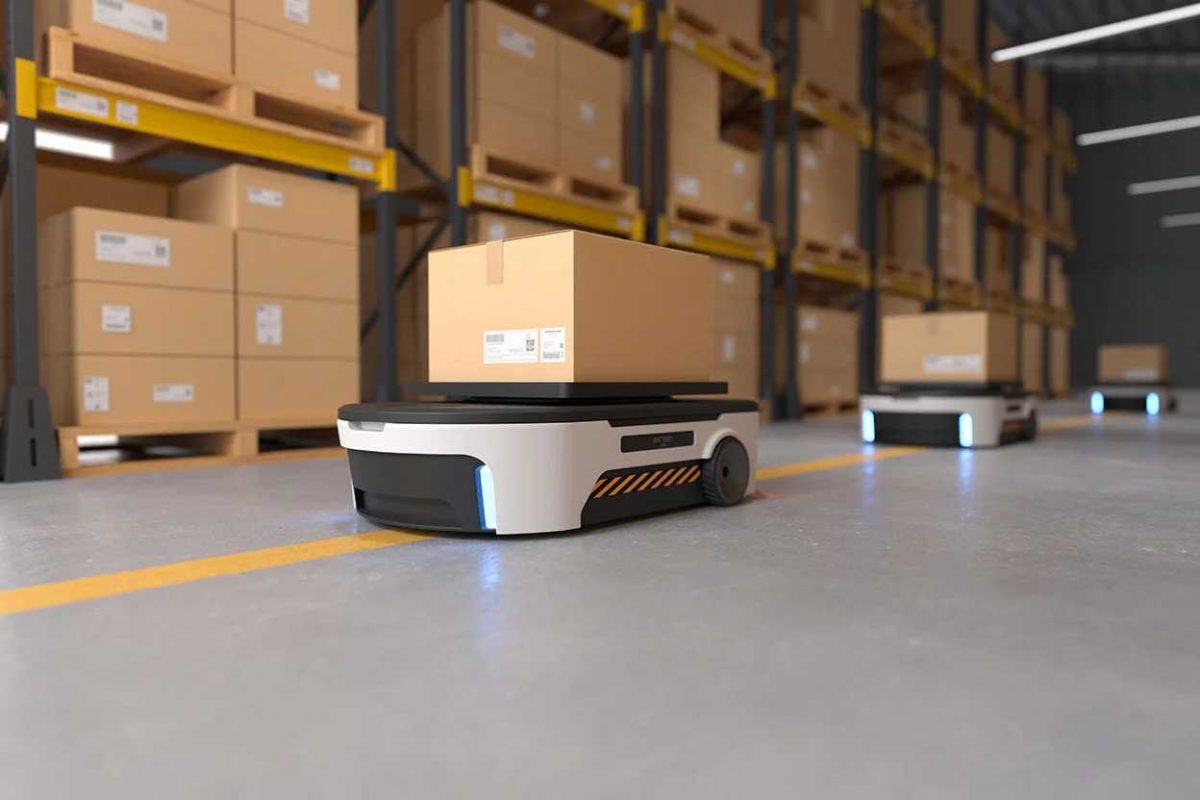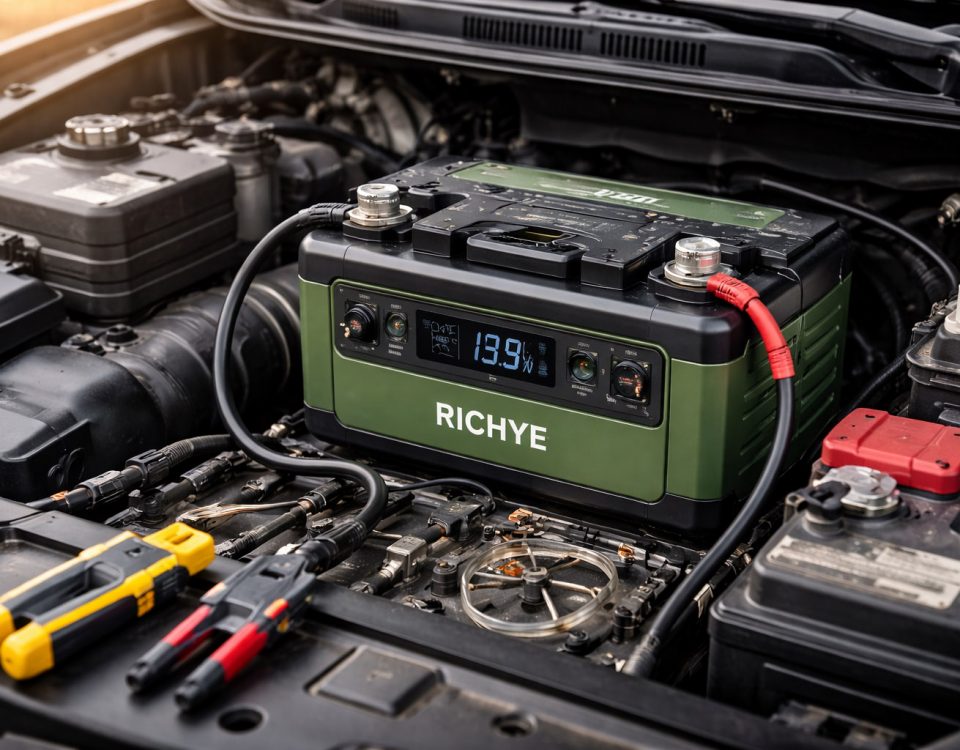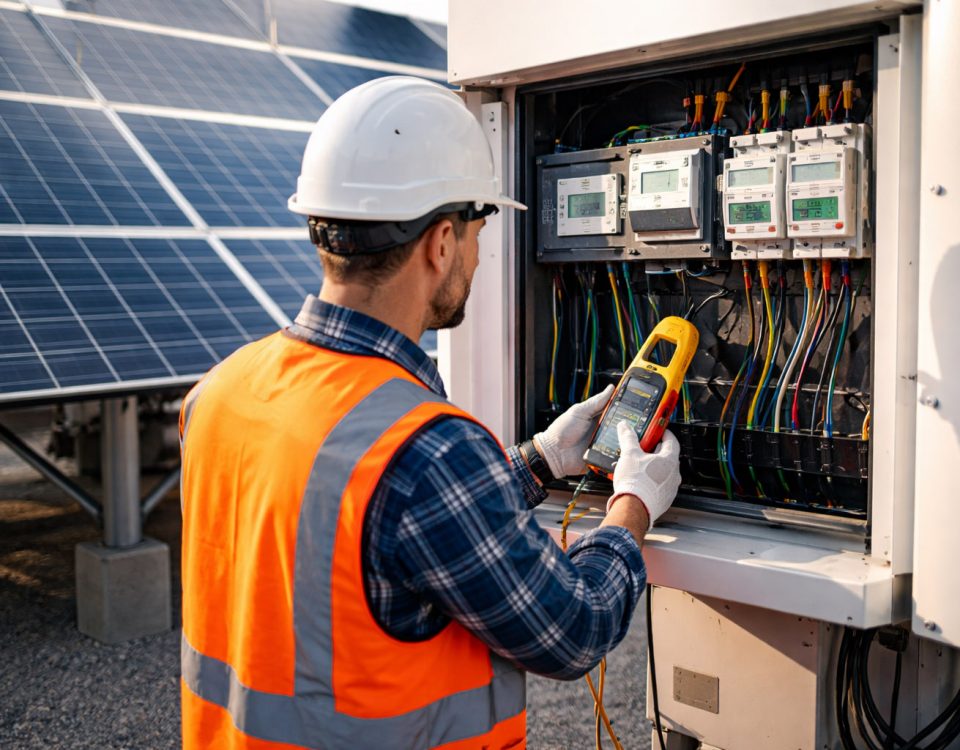หุ่นยนต์เคลื่อนที่อัตโนมัติ (AMRs) กำลังเปลี่ยนแปลงอุตสาหกรรมด้วยการเพิ่มประสิทธิภาพด้านโลจิสติกส์ ลดต้นทุนแรงงาน และเพิ่มประสิทธิภาพการดำเนินงาน จากคลังสินค้าไปจนถึงโรงงานผลิต AMRs กำลังกลายเป็นสิ่งสำคัญสำหรับธุรกิจที่ต้องการรักษาความสามารถในการแข่งขันในยุคแห่งระบบอัตโนมัติ แต่สิ่งใดที่ขับเคลื่อนหุ่นยนต์เหล่านี้ให้สามารถทำงานที่ซับซ้อนได้ทั้งวันทั้งคืน? คำตอบอยู่ที่หนึ่งในองค์ประกอบที่สำคัญที่สุดของ AMRs: แบตเตอรี่ลิเธียม.
ในบทความนี้ เราจะเจาะลึกถึงบทบาทสำคัญของแบตเตอรี่ลิเธียมที่มีต่อความสำเร็จของ AMR โดยสำรวจว่าแบตเตอรี่เหล่านี้มีอิทธิพลต่อประสิทธิภาพ ความคุ้มค่า และอายุการใช้งานอย่างไร นอกจากนี้ เราจะพูดถึงความท้าทายต่างๆ ที่เกี่ยวข้องกับการเลือกโซลูชันแบตเตอรี่ที่เหมาะสมสำหรับ AMR และเน้นย้ำว่า RICHYE ซึ่งเป็นผู้ผลิตแบตเตอรี่ลิเธียมชั้นนำ กำลังตอบสนองความต้องการที่เพิ่มขึ้นของอุตสาหกรรม AMR อย่างไร
การเพิ่มขึ้นของหุ่นยนต์เคลื่อนที่อัตโนมัติ
AMRs คือเครื่องจักรที่ขับเคลื่อนด้วยตัวเองซึ่งถูกออกแบบมาเพื่อทำงานซ้ำๆ โดยอัตโนมัติ สามารถขนส่งวัสดุ ขนย้ายผลิตภัณฑ์ผ่านกระบวนการผลิต และแม้กระทั่งช่วยในการจัดการสินค้าคงคลัง หุ่นยนต์เหล่านี้มีคุณค่าอย่างยิ่งในภาคส่วนต่างๆ เช่น โลจิสติกส์ การดูแลสุขภาพ และค้าปลีก เมื่อความต้องการในโซลูชันอัตโนมัติเพิ่มขึ้น ความต้องการแบตเตอรี่ที่เชื่อถือได้และมีประสิทธิภาพสูงเพื่อให้เครื่องจักรเหล่านี้ทำงานได้อย่างราบรื่นก็เพิ่มขึ้นเช่นกัน
ต่างจากหุ่นยนต์อุตสาหกรรมแบบดั้งเดิมที่ทำงานในสภาพแวดล้อมที่คงที่ AMRs จำเป็นต้องนำทางในพื้นที่ที่ไม่เป็นระเบียบและเปลี่ยนแปลงได้ตลอดเวลา พวกมันต้องหลีกเลี่ยงสิ่งกีดขวาง วางแผนเส้นทาง และปรับตัวให้เข้ากับสภาพแวดล้อมที่เปลี่ยนแปลงไปในเวลาจริง เพื่อให้บรรลุระดับความหลากหลายนี้ AMRs ต้องการแหล่งพลังงานที่ไม่เพียงแต่เชื่อถือได้เท่านั้น แต่ยังต้องสามารถส่งพลังงานอย่างต่อเนื่องเป็นเวลานานโดยไม่ต้องชาร์จไฟบ่อยครั้ง
บทบาทของแบตเตอรี่ลิเธียมใน AMRs
แบตเตอรี่ลิเธียม ได้กลายเป็นแหล่งพลังงานที่ได้รับความนิยมสำหรับ AMRs และมีเหตุผลที่ดี. คุณสมบัติที่ไม่เหมือนใครของเทคโนโลยีลิเธียม—ความหนาแน่นของพลังงานสูง, วงจรการใช้งานยาวนาน, และเวลาชาร์จที่รวดเร็ว—ทำให้เป็นโซลูชั่นที่เหมาะอย่างยิ่งสำหรับหุ่นยนต์เคลื่อนที่. มาดูกันว่าทำไมแบตเตอรี่ลิเธียมจึงมีความสำคัญอย่างยิ่งต่อความสำเร็จของ AMRs:
-
ความหนาแน่นของพลังงานสูง: หนึ่งในข้อได้เปรียบที่สำคัญที่สุดของแบตเตอรี่ลิเธียมคือความหนาแน่นของพลังงานสูง ซึ่งหมายความว่าสามารถเก็บพลังงานได้มากขึ้นในขนาดที่เล็กและน้ำหนักเบาเมื่อเทียบกับเทคโนโลยีแบตเตอรี่อื่น ๆ เช่น แบตเตอรี่ตะกั่ว-กรด หรือนิกเกิล-แคดเมียม สำหรับระบบ AMRs นี้หมายถึงระยะเวลาการทำงานที่ยาวนานขึ้นระหว่างการชาร์จ ทำให้หุ่นยนต์สามารถทำงานได้เป็นเวลานานโดยไม่ต้องหยุดพัก ด้วยความซับซ้อนและความสามารถในการทำงานอัตโนมัติที่เพิ่มขึ้นของหุ่นยนต์สมัยใหม่ ความสามารถในการรักษาประสิทธิภาพการทำงานที่สม่ำเสมอในระยะยาวจึงเป็นสิ่งจำเป็นสำหรับการเพิ่มผลผลิตให้สูงสุด
-
อายุการใช้งานยาวนาน: แบตเตอรี่ลิเธียมเป็นที่รู้จักกันดีในเรื่องของอายุการใช้งานที่ยาวนาน ซึ่งหมายถึงจำนวนรอบการชาร์จและคายประจุที่แบตเตอรี่สามารถทำได้ก่อนที่ประสิทธิภาพจะลดลงอย่างมีนัยสำคัญ สำหรับ AMR ที่ใช้งานอย่างต่อเนื่อง อายุการใช้งานของแบตเตอรี่ที่ยาวนานเป็นสิ่งจำเป็นเพื่อหลีกเลี่ยงการหยุดทำงานที่มีค่าใช้จ่ายสูงและการเปลี่ยนแบตเตอรี่ใหม่ ต่างจากแบตเตอรี่ตะกั่ว-กรด ซึ่งสูญเสียความจุอย่างรวดเร็ว แบตเตอรี่ลิเธียมสามารถใช้งานได้หลายพันรอบ ทำให้มีความน่าเชื่อถือในการทำงานและมีค่าใช้จ่ายรวมตลอดอายุการใช้งานที่ต่ำกว่า
-
ชาร์จเร็วและลดเวลาหยุดใช้งาน: รถนำทางอัตโนมัติ (AMR) จำเป็นต้องทำงานได้มากที่สุดเท่าที่เป็นไปได้ โดยเฉพาะในสภาพแวดล้อมที่มีความต้องการสูง เช่น คลังสินค้าหรือโรงงาน แบตเตอรี่ลิเธียมชาร์จได้เร็วกว่าแบตเตอรี่แบบดั้งเดิม ซึ่งหมายความว่า AMR สามารถกลับไปทำงานได้เร็วขึ้นหลังจากชาร์จไฟนอกจากนี้ แบตเตอรี่ลิเธียมมีความลึกของการคายประจุ (DoD) ที่สูงกว่า ซึ่งช่วยให้ระบบ AMR สามารถใช้ส่วนหนึ่งของความจุได้มากขึ้นโดยไม่ทำให้แบตเตอรี่เสียหาย ประสิทธิภาพนี้ช่วยให้หุ่นยนต์ใช้เวลาทำงานมากขึ้นและใช้เวลาในการชาร์จน้อยลง
-
การออกแบบที่เล็กกว่าและเบาขึ้น: แบตเตอรี่ลิเธียมมีน้ำหนักเบากว่าแบตเตอรี่ประเภทอื่น เช่น แบตเตอรี่ตะกั่ว-กรด อย่างมีนัยสำคัญ นี่เป็นคุณสมบัติที่สำคัญสำหรับ AMRs เนื่องจากน้ำหนักมีผลโดยตรงต่อการเคลื่อนที่และความคล่องตัว แบตเตอรี่ที่เบากว่าหมายความว่าหุ่นยนต์สามารถบรรทุกน้ำหนักได้มากขึ้น เดินทางได้เร็วขึ้น และใช้พลังงานน้อยลง ซึ่งทั้งหมดนี้ช่วยเพิ่มประสิทธิภาพการทำงาน สำหรับ AMRs ที่จำเป็นต้องเคลื่อนที่ในช่องทางแคบหรือพื้นที่จำกัด การออกแบบแบตเตอรี่ที่มีขนาดกะทัดรัดเป็นสิ่งจำเป็นสำหรับการเพิ่มประสิทธิภาพการทำงาน
-
ความปลอดภัยและความน่าเชื่อถือ: ความปลอดภัยเป็นสิ่งสำคัญสูงสุดเมื่อพูดถึงการจ่ายพลังงานให้กับระบบอัตโนมัติ และแบตเตอรี่ลิเธียมเหมาะสมอย่างยิ่งในการตอบสนองความต้องการนี้แบตเตอรี่ลิเธียมสมัยใหม่มาพร้อมกับระบบจัดการแบตเตอรี่ขั้นสูง (BMS) ที่ตรวจสอบสุขภาพของแบตเตอรี่เพื่อให้แน่ใจว่าทำงานภายในพารามิเตอร์ที่ปลอดภัย ระบบ BMS ป้องกันการชาร์จเกิน การร้อนเกินไป และการคายประจุลึก ซึ่งช่วยลดความเสี่ยงของการล้มเหลวของแบตเตอรี่หรือเหตุการณ์ความปลอดภัยได้อย่างมีนัยสำคัญ ระดับการควบคุมนี้มีความสำคัญอย่างยิ่งสำหรับ AMRs ซึ่งจำเป็นต้องทำงานโดยอัตโนมัติโดยไม่ต้องมีการแทรกแซงจากมนุษย์
-
ประโยชน์ต่อสิ่งแวดล้อม: ในขณะที่อุตสาหกรรมต่าง ๆ มุ่งมั่นที่จะลดผลกระทบต่อสิ่งแวดล้อม การใช้แบตเตอรี่ลิเธียมมีข้อได้เปรียบด้านความยั่งยืนที่สำคัญ เทคโนโลยีลิเธียมไอออนปล่อยก๊าซเรือนกระจกน้อยกว่าตลอดอายุการใช้งานเมื่อเทียบกับแบตเตอรี่ตะกั่วกรด นอกจากนี้ ความสามารถในการรีไซเคิลของแบตเตอรี่ลิเธียมยังช่วยส่งเสริมอนาคตที่เขียวขจีและยั่งยืนมากขึ้นสำหรับอุตสาหกรรมที่พึ่งพา AMRs สำหรับบริษัทที่มุ่งเน้นการลดรอยเท้าคาร์บอน การเลือกใช้แบตเตอรี่ลิเธียมสำหรับหุ่นยนต์ของพวกเขาสอดคล้องกับเป้าหมายด้านสิ่งแวดล้อมที่กว้างขึ้น
ความท้าทายในการเลือกแบตเตอรี่ที่เหมาะสมสำหรับ AMRs
แม้ว่าแบตเตอรี่ลิเธียมจะมีข้อดีมากมาย แต่ก็มีความท้าทายบางประการเช่นกัน การเลือกแบตเตอรี่ลิเธียมที่เหมาะสมสำหรับ AMR จำเป็นต้องมีการประเมินปัจจัยหลายประการอย่างรอบคอบ:
-
ขนาดและการกำหนดค่าของแบตเตอรี่: AMR แต่ละประเภทมีความต้องการพลังงานที่แตกต่างกัน ขึ้นอยู่กับขนาด น้ำหนัก และความซับซ้อนของงานที่ปฏิบัติ หุ่นยนต์บางรุ่นอาจต้องใช้แบตเตอรี่ความจุสูงเพื่อให้ทำงานได้นานขึ้น ในขณะที่บางรุ่นอาจให้ความสำคัญกับแบตเตอรี่ที่มีน้ำหนักเบาเพื่อเพิ่มความสามารถในการเคลื่อนที่ จึงเป็นสิ่งสำคัญที่จะต้องเลือกแบตเตอรี่ที่เหมาะสมกับข้อกำหนดการออกแบบของหุ่นยนต์โดยไม่กระทบต่อประสิทธิภาพการทำงาน
-
ระบบจัดการแบตเตอรี่ (BMS): ระบบจัดการแบตเตอรี่ (BMS) ที่เชื่อถือได้มีความสำคัญอย่างยิ่งต่อการตรวจสอบสุขภาพของแบตเตอรี่และรับประกันความปลอดภัยระหว่างการใช้งาน เทคโนโลยี BMS ขั้นสูงสามารถเพิ่มประสิทธิภาพการทำงานของแบตเตอรี่โดยการปรับอัตราการชาร์จและให้ข้อมูลสถานะแบตเตอรี่แบบเรียลไทม์ การเลือกใช้แบตเตอรี่ที่มีระบบ BMS ที่ซับซ้อนสามารถยืดอายุการใช้งานของแบตเตอรี่และลดค่าใช้จ่ายในการบำรุงรักษาได้
-
การพิจารณาต้นทุน: แม้ว่าแบตเตอรี่ลิเธียมอาจมีค่าใช้จ่ายเริ่มต้นสูงกว่าเมื่อเทียบกับประเภทอื่น ๆ แต่ด้วยอายุการใช้งานที่ยาวนาน ประสิทธิภาพที่เหนือกว่า และความต้องการในการบำรุงรักษาที่ต่ำ ทำให้แบตเตอรี่ลิเธียมเป็นทางเลือกที่คุ้มค่าในระยะยาว บริษัทจำเป็นต้องชั่งน้ำหนักระหว่างการลงทุนเริ่มต้นกับการประหยัดในระยะยาวเพื่อกำหนดตัวเลือกแบตเตอรี่ที่เหมาะสมที่สุดสำหรับความต้องการเฉพาะของตน
RICHYE: ผู้ผลิตแบตเตอรี่ลิเธียมที่เชื่อถือได้สำหรับ AMRs
ริชชี่ เป็นผู้ผลิตแบตเตอรี่ลิเธียมชั้นนำที่มีชื่อเสียงในด้านคุณภาพสูง, น่าเชื่อถือ, และคุ้มค่า. เชี่ยวชาญในการผลิตแบตเตอรี่ลิเธียมตามความต้องการสำหรับหลากหลายการใช้งาน—รวมถึงหุ่นยนต์เคลื่อนที่อัตโนมัติ—RICHYE มุ่งมั่นที่จะให้บริการโซลูชั่นพลังงานขั้นสูงที่ตอบสนองความต้องการที่เข้มงวดของอุตสาหกรรมอัตโนมัติ.
แบตเตอรี่ลิเธียมของ RICHYE โดดเด่นด้วยประสิทธิภาพที่ยอดเยี่ยม คุณสมบัติด้านความปลอดภัย และความยั่งยืนต่อสิ่งแวดล้อม ด้วยการมุ่งเน้นในการนำเสนอผลิตภัณฑ์ที่ใช้งานได้ยาวนานและประหยัดพลังงาน RICHYE ได้สร้างชื่อเสียงในฐานะพันธมิตรที่เชื่อถือได้สำหรับบริษัทที่ต้องการเพิ่มประสิทธิภาพระบบหุ่นยนต์ของตน
ไม่ว่าจะเป็นแบตเตอรี่ความจุสูงสำหรับหุ่นยนต์งานหนัก หรือโซลูชันน้ำหนักเบาสำหรับหุ่นยนต์เคลื่อนที่อัตโนมัติ (AMR) ที่คล่องตัว RICHYE นำเสนอทางออกที่ออกแบบเฉพาะเพื่อรับประกันประสิทธิภาพการทำงานสูงสุด ในขณะที่อุตสาหกรรมหุ่นยนต์ยังคงเติบโตอย่างต่อเนื่อง RICHYE ยังคงเป็นผู้นำด้านนวัตกรรม นำเสนอเทคโนโลยีแบตเตอรี่ล้ำสมัยที่ขับเคลื่อนอนาคตของหุ่นยนต์อัตโนมัติ
บทสรุป: อนาคตของหุ่นยนต์อัตโนมัติและแบตเตอรี่ลิเธียม
ความสำเร็จของหุ่นยนต์เคลื่อนที่อัตโนมัติเชื่อมโยงอย่างแยกไม่ออกกับคุณภาพและความน่าเชื่อถือของแหล่งพลังงานของพวกมัน แบตเตอรี่ลิเธียมมอบประสิทธิภาพ ความปลอดภัย และความยั่งยืนที่หุ่นยนต์เคลื่อนที่อัตโนมัติต้องการเพื่อทำงานอย่างมีประสิทธิภาพในสภาพแวดล้อมที่เปลี่ยนแปลงได้ เมื่อความต้องการในระบบการอัตโนมัติเพิ่มขึ้นอย่างต่อเนื่อง แบตเตอรี่ลิเธียมจะยังคงเป็นตัวขับเคลื่อนหลักของนวัตกรรมในอุตสาหกรรมหุ่นยนต์
การเลือกโซลูชันแบตเตอรี่ที่เหมาะสมสามารถเพิ่มประสิทธิภาพของ AMRs ลดเวลาหยุดทำงาน และประหยัดค่าใช้จ่ายในระยะยาวได้ ด้วยบริษัทอย่าง RICHYE ที่เป็นผู้นำในเทคโนโลยีแบตเตอรี่ลิเธียม อนาคตของ AMRs ดูสดใสกว่าที่เคย




